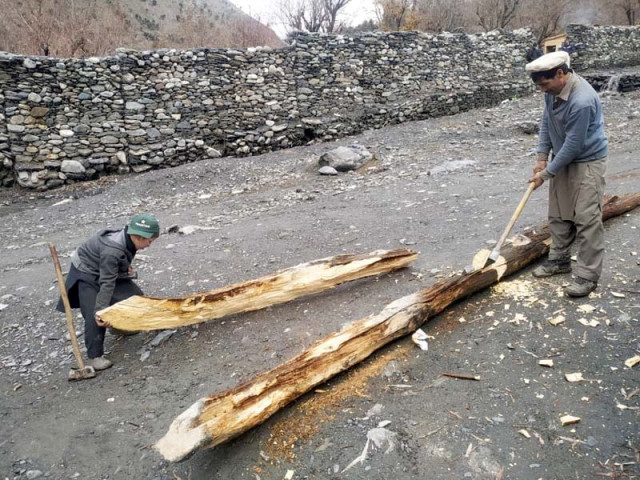Kailash forests the losers in extreme weather
In the absence of power or gas, locals rely on firewood to stave off the cold

A man and a boy chop up a tree trunk which will be used as firewood. PHOTO: EXPRESS
Locals estimate that a single household in the valley can burn up to 80 kilogrammes of firewood every day in the biting cold. On the other hand, hotels and guesthouses in the tourist-focused segment of the valley can burn through 200 kilogrammes of firewood daily.
To fuel such voracious need for wood, hundreds of trees are chopped down every winter. The abundant use of firewood and continuous cutting of trees has started taking a toll on the valley’s natural, scenic beauty.
This as put the remote Kailash valley at the risk of expedited deforestation, and in turn, its protected way of life.
Kailash, a popular tourist destination, is comprised of three valleys including Birrir, Rumbur, and Bamburet.
Known as the residence of the ancient indigenous Kaislaha tribes — who some attribute as descendants of Alexander the Great —the valleys welcome thousands of local and international tourists every year.
Many of these tourists, who are itching to see for themselves Pakistan’s picturesque north, particularly throng the Kailash Valley to experience the spring festival of Chilum Joshi in May, Pou in August and the winter festival of Chowmoss in mid-December.
In the recently concluded Chowmoss’ festival, hundreds of tourists have gathered in the valley to experience and partake in the winter festival. The tourists, both local and international, shared their fascination for the heritage, culture and traditions of the Kailasha community, which has been granted protected status by the United Nations Educational, Scientific and Cultural Organization (UNESCO).
As much as the influx of tourists contributes to the local economy, the Kailasha people are critical about the impact such tourism has on local ecology.
The visiting tourists, for their part, tend to criticise the K-P government for remaining oblivious to the timber mafia in the area, which they believe are responsible for the fast receding forests in the valleys.
Until a few years ago, trees of Diyar (Deodar – Himalayan Cedar), Walnut and Sycamore could be seen covering the hills in the valley, but today, these same hills appear barren, said a local.
Locals of the valley say they do not have access to utilities such as gas which they can burn to keep themselves warm during the winter. As a result, they are forced to cut trees to use as firewood.
“We are aware of the loss of forestation and we care about the issue but we have no other way of keeping warm besides cutting trees and burning wood when the temperature drops to -7° Celsius in the winters,” said Azmat Ali, a local of Birrir Valley
Shamsuddin, another local believes that it is the government’s fault for not providing access to gas in the valley.
“Past governments have made several promises of providing gas, but to date, we are forced to rely on firewood for heat,” he said, adding that much of the valley relies on tourism as a means of income and the valley’s economy will surely take a hit if tourists stop visiting due to nude hillsides.
“The timber mafia and locals are felling trees at an alarming rate and it seems that there is no one left to take notice of the issue. Our valley is also worst hit by global warming in last few years and we have started noticing the changing weather patterns,” said Mahrab khan a tourist guide in the Kailash Valley while talking to The Express Tribune.
“We demand the government to take prompt action and also provide access to Sui gas to the locals of the valley before it is too late,” he added.
Published in The Express Tribune, December 26th, 2019.


















COMMENTS
Comments are moderated and generally will be posted if they are on-topic and not abusive.
For more information, please see our Comments FAQ